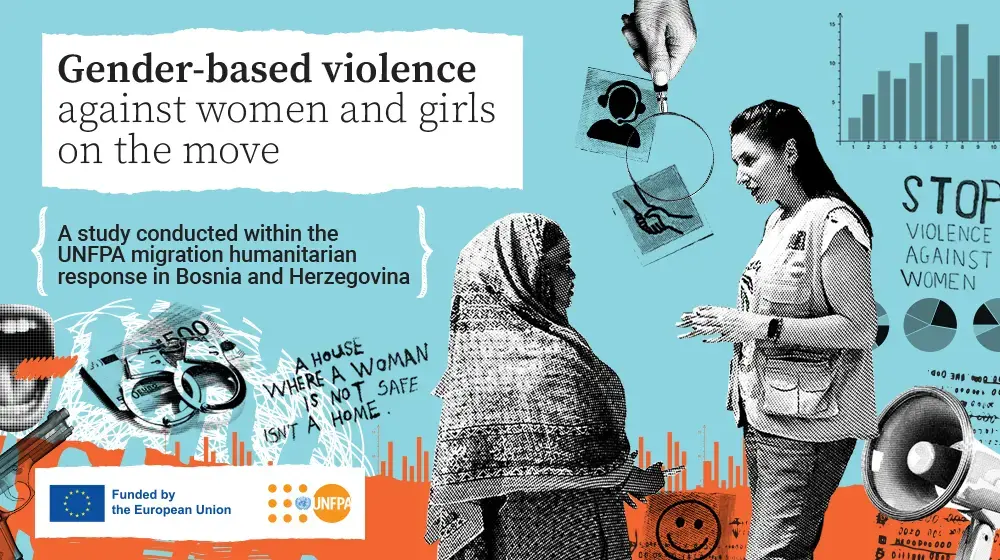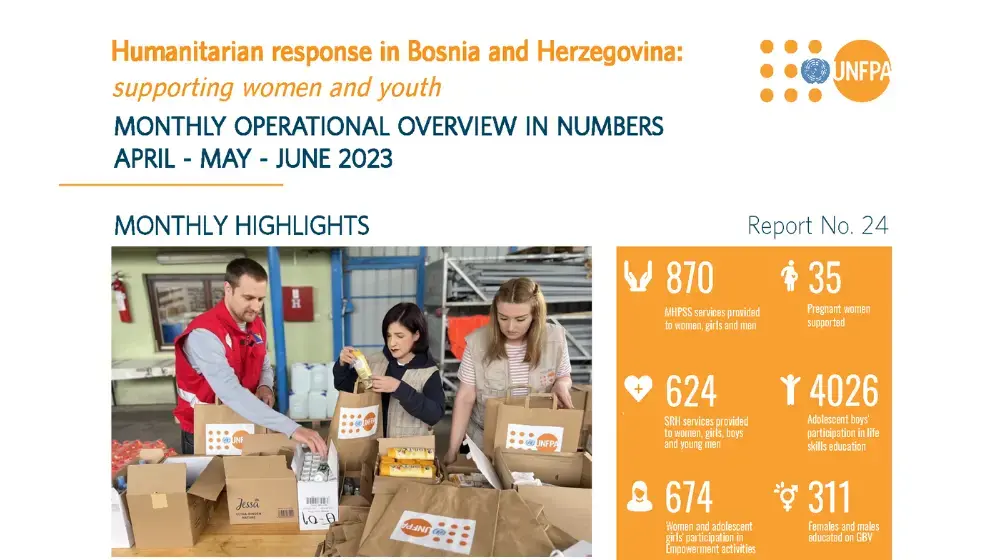“ We must unite. Violence against women must not be tolerated, in any form, in any context, in any circumstance, by any political leader or by any government. There can be no exceptions, no excuses and no delay.”
UNITED NATIONS SECRETARY-GENERAL BAN KI-MOON
UNFPA ACTIVITIES ON COMBATING SEXUAL VIOLENCE IN CONFLICT
Bosnia and Herzegovina (BiH) witnessed mass rapes, sexual torture, sexual slavery and other forms of sexual violence directed against women, men and children during the 1992 – 1995 war which resulted in an estimated 20,000 victims of rape and other forms of sexual violence.[1]
The legal framework of Bosnia and Herzegovina has not dealt with the survivors of conflict related sexual violence in an adequate manner. General public interest, as well as overall social status of the survivors of these crimes, is at dissatisfactory level. The phenomenon of conflict related sexual violence is still perceived as a private matter, even though it is formally recognized as a public problem and a human rights issue. Despite the progress BiH has made in terms of advancing human rights and gender equality, the women survivors of conflict related sexual violence are still not sufficiently protected, and some of the rights guaranteed by the BiH laws are not fully respected.
United Nations Population Fund (UNFPA) is mandated to deal with gender based violence, sexual and reproductive health and population issues in general. Based on that mandate the UNFPA country office in BiH is actively involved in working on these issues, and since 2010 implements activities aimed to improve the status of survivors of conflict related sexual violence.
UNFPA is currently implementing a project which provides support to development of systematic resolution to the problems that emerged as a result of sexual violence during the war in Bosnia and Herzegovina. The project is supported by UN Action Against Sexual Violence, and the period of implementation runs between June 2010 and December 2012.
Through this project, and in line with the Country Programme Action Plan for BiH signed between UNFPA and the BiH Council of Ministers, the UNFPA provides financial and technical support to the Ministry of Human Rights and Refugees during the development of the Programme for Improvement of the Status of Women Victims of Wartime Rape, Sexual Violence and Other Forms of Torture in BiH for the period 2013-2016. We also cooperate with a number of local and international non-governmental organizations.
PROGRAMME FOR IMPROVEMENT OF THE STATUS OF WOMEN VICTIMS OF WARTIME RAPE, SEXUAL VIOLENCE AND OTHER FORMS OF TORTURE IN BIH FOR THE PERIOD 2013-2016
The development of the Programme for Improvement of the Status of Women Victims of Wartime Rape, Sexual Violence and Other Forms of Torture in BiH was carefully designed in order to ensure an inclusive and transparent process and participation from all key actors – representatives of the legislative and executive power, health sector, the justice sector, victim associations and the civil society. During the development of the Programme ten consultative meetings were organized throughout Bosnia and Herzegovina in order to provide the representatives of the local community with an opportunity to influence the drafting of the Programme from the very beginning.
The Programme contains four key segments when it comes to improving the status of women survivors of conflict related sexual violence: 1) legal framework and its harmonization with international standards, 2) access to free legal aid and adequate protective measures for victim witnesses at the war crime proceedings, 3) strengthening capacities of service providers, and 4) building partnership between the governmental and non-governmental sector.
It is expected that the Programme will be finalized and adopted by the Council of Ministers by the end of 2012. For the first time Bosnia and Herzegovina will have a state-level Programme that will systematically deal with the consequences of the sexual violence that occurred during the 1992-1995 war in BiH. This Programme is part of the overall attempt of BiH to deal with massive human rights violations that took place in the past.
UNFPA will continue to provide support to the relevant BiH institutions during the implementation of the Programme.
FIGHT AGAINST STIGMA AND ADVOCASY AT THE GLOBAL LEVEL
Stigma, as a consequence of rape and other forms of sexual violence during conflicts, additionally marginalizes the victims and contributes to their re-traumatisation and additional suffering. UNFPA Country Office in BiH has recognized advocacy activities as an important element in the overall approach to improvement of the status of survivors of conflict related sexual violence. We implement activities aimed at raising awareness of the general public and decision-makers, both on the domestic and international level.
In 2010 UNFPA launched an informative campaign called S.O.S. Sound of Silence that targeted public awareness on the status of the women victims of sexual violence during the war. The campaign includes:
Production of a documentary 21st Century Bosnia: Legacy of Rape in cooperation with UN TV which was seen by an audience of closely 6 million people around the world;
A chapter on the survivors of sexual violence during wartime in BiH in the report on the State of the World Population 2010;
A photo exhibition was put up in Sarajevo, Istanbul, New York, Munich and Brussels capturing the lives and the plight of the women survivors in their quest to attain their human rights. More than 1,000 people visited the exhibition;
Preparations for a monograph about women survivors of conflict related sexual violence in BiH are ongoing. The monograph will honour the survivors and at the same time provide an insight into their current wellbeing. The development of the monograph will be complemented by exhibiting photographs that originated during the work on the monograph itself;
With the assistance of UNFPA, a representative of women victims of war, Ms. Enisa Salcinovic, participated at the gathering such as the side event of the 55th session of the Commission on the Status of Women, a functional commission of the United Nations Economic and Social Council, in New York; at the conference “Gender and Security – the case of Bosnia and Herzegovina” in Brussels; and at the conference “NO to domestic violence” in Istanbul;
In cooperation with the Ministry of Human Rights and Refugees UNFPA is hosting a conference Ensuring Justice, Reparations and Rehabilitation for Victims of Conflict Related Sexual Violence. The aim of the conference is to initiate a regional network for advocacy, review the activities implemented by all key actors in the region, and identify concrete steps necessary for improving the status and enabling the fulfilment of the human rights for the victims of conflict related sexual violence.
THE RESOLUTIONS OF THE UNITED NATIONS
United Nations Security Council Resolution 1325 calls upon the states to ensure increased representation of women at a decision making level in conflict resolution and peace building processes and points to specific needs of women during conflict, repatriation, resettlement, rehabilitation, reintegration and reconstruction.
United Nations Security Council Resolution 1820 defines gender based violence as a security issue of importance for building long-standing and sustainable peace and considers rape and other forms of GBV during and after armed conflicts as war crimes and crimes against humanity.
United Nations Security Council Resolution 1888 urges states to undertake comprehensive legal and judicial reforms in conformity with international law in order to bring perpetrators to justice and ensure access to justice for survivors and that they are treated with dignity throughout the justice process and are protected and receive redress for their suffering.
United Nations Security Council Resolution 1889 calls for improved women participation during all stages of peace process, and calls on designing concrete strategies to address needs and priorities of women - physical security, better socio-economic conditions through education, income generating programs, access to basic services, gender responsive law enforcement, and access to justice.
SEXUAL VIOLENCE WITHIN THE INTERNATIONAL LEGAL FRAMEWORK [2]
When taken collectively, the statutes and case law of the International Tribunals for the Former Yugoslavia and Rwanda, the Special Court for Sierra Leone, the Extraordinary Chambers in the Courts of Cambodia and the ICC Rome Statute define sexual violence to encompass: rape, sexual slavery, forced prostitution, forced pregnancy, enforced sterilization and any other form of sexual violence of comparable gravity, which may include indecent assault, trafficking, inappropriate medical examinations and strip searches.
Sexual violence as a war crime
- May constitute war crimes if committed in the context of and associated with an armed conflict.
Sexual violence as a crime against humanity
- Any of the following acts when committed as part of a widespread or systematic attack directed against a civilian population, with the perpetrator’s knowledge that such conduct was part of the attack:
-
Rape
-
Sexual slavery
-
Enforced prostitution
-
Forced pregnancy
-
Enforced sterilization
-
Or any other form of sexual violence of comparable gravity
- Crimes against humanity do not require a connection with armed conflict.
Sexual violence as a form of torture
- Torture is defined as the intentional infliction of severe pain or suffering, whether physical or mental, upon a person in the custody or under the control of the accused
- Sexual violence at the instigation of a public official, or otherwise attributable to the State, can constitute torture.
Sexual violence as an element of genocide
- Genocide is defined as any of the following acts committed with intent to destroy, in whole or in part, a national, ethnical, racial or religious group as such:
-
Killing members of the group
-
Causing serious bodily or mental harm to member of the group
-
Deliberately inflicting on the group conditions of life calculated to bring about its destruction in whole or in part
-
Imposing measures intended to prevent births within the group
-
Forcibly transferring children of the group to another group.
- Sexual violence has been used as a step in the process of group destruction and to alter the composition or territory.
[1] Parliamentary Assembly of the Council of Europe. Resolution 1670 (2009).
[2] Analytical and Conceptual Framing of Conflict-Related Sexual Violence, 2011. The concept was developed by the Secretary General Special Representative of Sexual Violence in Conflict based on the statutes and case law of the International Tribunals for the Former Yugoslavia and Rwanda, the Special Court for Sierra Leone, the Extraordinary Chambers in the Courts of Cambodia and the ICC Rome Statute.




